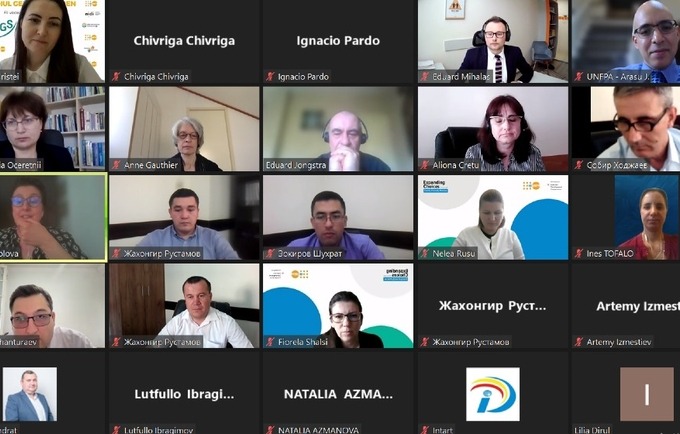
Originally posted by UNFPA. To access the original article, click here.
12 May 2022: The Republic of Moldova and Uruguay shared their experience in preparing and conducting the Generations and Gender Survey (GGS) during a Regional webinar organized by UNFPA EECA RO with the financial support of the India-UN Partnership Fund. The online Regional webinar leveraged the opportunities of south-south cooperation and knowledge-sharing, by presenting Uruguay and Moldova’s good practices and lessons learned in preparing the Generations and Gender Survey and modalities the GGS data was used for scientific purposes and evidence-based policy development to advance Demographic Resilience.
Representatives from Europe, Central Asia, and Latin America, from developed and developing countries that are at different stages of GGS implementation or are interested to conduct GGS, learned how to prepare, conduct and use the survey data for better demographic policies.
“The GGS is a good data tool used for policy advice and transformation. The Republic of Moldova is one of few developing countries that conducted this complex survey, and its experience is relevant for other developing countries that are currently facing similar demographic challenges and which are seeking mechanisms of building people-centered and data-driven population policies as part of the Decade of Demographic Resilience”, stated UNFPA Deputy Regional Director a.i., Marta Diavolova
Also, the webinar contributed to strengthening South-South cooperation through sharing experiences between countries.
”Promoting south-south cooperation is important because we believe this is a modality that is very instrumental in enabling countries to find the knowledge, solutions and expertise to better design their programs and have the most impact”, stated Ines Tofalo, Chief of Programme Support Unit, The United Nations Office for South-South Cooperation.
In 2021, the Republic of Moldova – one of 17 countries that conducted the survey – launched the GGS results. The GGS is part of the UNFPA Demographic Resilience Programme that supports the Government in improving their national policies and shaping the demographic future of the country based on opportunities and innovation. The results of the survey have already been included in several policy documents to promote family-friendly policies, work-life balance, active ageing, individual childcare services, and others in the development.
“In the context of many demographic challenges the Republic of Moldova is facing currently, it was important to conduct the Generations and Gender Survey to provide quality disaggregated data that the Government of Moldova is using to develop a comprehensive package of policies that are people-centered and evidence-based,” mentioned Aliona Cretu, Head of Demographic Policies Unit at the Ministry of Labour and Social Protection, Republic of Moldova.
Anne Gauthier, Director of the Generations and Gender Programme, Netherland Interdisciplinary Demographic Institute: “The ingredients to Moldova’s success – because there is no doubt it was a big success – are informative for the other countries to think what were the key ingredients: solid funding, strong UNFPA leadership, good cooperation with Governmental partners, professional research company, range of activities including data dissemination and integration in university curricula and demographic policy documents”
Generations and Gender Survey was conducted for the first time in Moldova in 2020 covering more than 10,000 people from the entire country. This survey represents an individual-level panel survey that provides data on issues of fertility decisions, work-life balance, transition to adulthood, and intergenerational exchanges with a longitudinal perspective.
The GGS in the Republic of Moldova is implemented by the UNFPA Moldova Country office in partnership with the Ministry of Labour and Social Protection (MLSP), the National Bureau of Statistics (NBS) and the Netherlands Interdisciplinary Demographic Institute (NIDI), with the financial support of the MLSP, India-UN Development Partnership Fund, and UNFPA.
